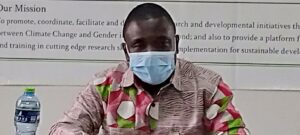Climate change threatens food security in Africa – University Lecturer

Climate-related migrants might rise between 200 million and more than one billion by the middle of the century if world leaders failed to take drastic action to stabilize the global climate system.
Dr Michael Addaney, a lecturer at the School of Geosciences, University of Energy and Natural Resources (UENR), said Africa would bear the brunt, as major crops on the continent, such as maize, millet and sorghum were highly sensitive to changes in temperature.
This will result in crop losses and hunger, thereby exacerbating childhood malnutrition and stunting.
As world leaders gather in Glasgow, Scotland for the 26th Conference of Parties (COP26) of the United Nations Framework Convention on Climate Change (UNFCCC), Dr Addaney reminded the world wealthier nations to renew and honour the pledge to mobilize $100 billion a year to help developing countries to cope with climate change.
Addressing a news conference in Sunyani, Dr Addaney called on Africa leaders at the conference to dedicate a deeper focus on highlighting the inequalities of climate change and the diverse nature of its impacts and implications, thereby making efforts to emphasize climate change as social, economic and cultural issues and not just an environmental matter.
“Political representatives at the local, national and multinational levels must treat climate change as a matter of fundamental human rights and inter-generational justice issue and to give climate change implications and impacts a growing space in political agenda,” he said.
At the national level, Dr Addaney underscored the importance for the government and her partners to provide farmers, especially in rural areas with financial support, capacity building and training in organic, regenerative and climate-resilient techniques.
“We must also invest in and promote sustainable packaging technology, which minimizes the use of plastic and other polluting materials as much as possible and standardize packaging so that it can be reused and recycled efficiently based on, but not limited to, carbon intensity, water consumption, packaging and food origin for large supply chain actors,” Dr Addaney stated.
He also called on local and multinational industries and academic institutions, including universities and research institutions to adopt green energy technologies holistically, ranging from wind and solar to hydroelectric, tidal and geothermal and biomass to mitigate the threatening effects of climate change.
Local communities, including professional, religious and cooperative associations, should prioritize afforestation and reforestation as climate change mitigation actions at the local level and that should be all-inclusive.
Dr Addaney lauded the government’s Green Ghana programme, which planted more than 10 million trees nationwide and called on the populace to support while urging the government to replicate the programme at least bi-annually.
Professor Berchie Asiedu, the Director of the Centre for Climate Change and Gender Studies, UENR, expressed concern about erratic flooding and drought, changes in rainfall and weather patterns, drying up of river bodies and recurring flooding and disasters in parts of the country.
He said desertification in the Northern Region, prolonged dry season in the Volta Basin and perennial water challenges in parts of the country underlined the importance for the nation to introduce pragmatic measures to tackle climate change in a more proactive manner.
Source: GNA
